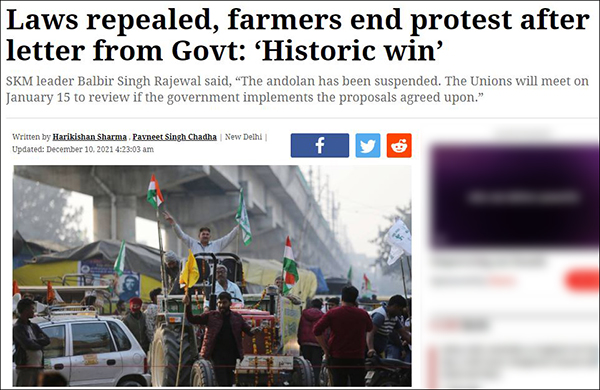【Text/Observer Network Feng Zhiyuan】
"This is a historic victory." After more than a year of fighting, farmers' representatives negotiating with the government spoke excitedly after the Modi government agreed to repeal three new agricultural laws and make concessions to farmers' demands.
In response to the government's concessions, on December 9, Balbir Singh Rajewal, the leader of the United Farmers' Front (SKM), who led the protests, also announced that "the protests have stopped" as well. Indian media reported that farmers will hold a celebration tomorrow (11th) and start their journey back home after that.
Although the protest is over, it is not over. Rajwar mentioned on the same day that the farm unions involved in the protests will "reunite" on January 15 next year to check whether the Indian government has "reneged on its word". If this is the case, they will continue to fight.

Screenshot of the Indian Express report
According to the News of Indian Express (Indian Express), New Delhi Television (NDTV) and other Indian media on the 10th, the United Front of Indian Farmers (hereinafter referred to as the "United Front"), which negotiated with the government on behalf of farmers, held a meeting at noon on the same day in the Singhu area next to the capital Delhi.
After the meeting, the United Front said it had received an "official letter" from the Indian government stating that it "agreed to all pending demands of the peasants". In response, the United Front "officially announced the cessation of anti-government demonstrations (morchas) everywhere."
"This is a historic victory." Ashok Dhawale, one of the five farmers' representatives negotiating with the Indian government, said excitedly, "For more than a year, farmers everywhere have been protesting around Delhi in the face of the wind and rain, facing the coronavirus and slander. In this way, the Indian government had to repeal three new laws against the peasants and the people. ”
Since then, farmers who participated in the protests have flocked to celebrate the victory.
However, due to the sudden death of Indian Defense Chief of Defense Chief Bipin Rawat and others in the plane crash on the 8th, the farmers decided to postpone the celebration to the 11th, and after the event began to return home.
Indian farmers celebrate victory Pictured from the people's vision
On September 20 last year, the Federal House (Upper House) of the Indian Parliament passed three new agricultural laws that deregulated crop prices. This has led to mass protests by Indian farmers over the three new laws since last October.
Observer columnist Vijay Prashad believes that Indian farmers fear that removing government regulation of the agricultural market will instead lead them to markets controlled by digital platforms owned by companies such as Metacosm (formerly Facebook), Google, Anderson Industries. These companies will not only use their control over these platforms to determine production distribution, but also dominate the entire food cycle from production forms to consumption habits through control of data.
On November 19 this year, Indian Prime Minister Narendra Modi publicly stated that he would repeal three controversial agricultural reform bills; on November 29, the Indian parliament also announced the repeal of three agricultural reform bills of the Modi government.
In the amended bill, the Indian government agreed to enact a new law to ensure government guaranteed prices for crops other than rice and wheat.
Despite the Above Gestures by the Indian Government, protesters have made a number of demands and the protests have not stopped.
The Indian government reportedly proposed to farmers on December 7 to drop all case charges against farmers after the protests were over. However, farmers, in order to prevent "settling accounts after the autumn", rejected this request, arguing that the government should guarantee the withdrawal of relevant allegations in writing before the farmers ended their protests. In addition, the farmers also proposed that the government should compensate the families of the farmers who died in the protests.
Subsequently, the Indian government sent revised opinions to farmers on the 8th, promising to meet the above requirements of farmers.
The large-scale peasant protests that lasted for more than a year have become "one of the biggest challenges facing the Modi government", the BBC said on the 9th, and at the same time, the farmers have also made huge sacrifices.
Dozens of people have died during the protests, including sweltering heat, cold and COVID-19. Yogendra Yadav, one of the protest leaders, also mentioned that some farmers died in extreme cold, heart attacks and traffic accidents in the winter.
However, india has a different version of the death toll. In a statement issued by the Communist Party of India (Marxism) on November 19, it was stated that "more than 750 peasants died in this struggle". The BBC also quoted United Front leader Rajvar as saying that "more than 700 farmers died during the protests". "Volunteers collected information about the death toll during the protest and then verified it with farmers' organizations," he said. ”
According to the Hindustan Times reported on December 1, Narendra Singh Tomar, India's federal agriculture minister, said on the same day that there was "no record of farmers dying during the protests" on the Indian government side.
This article is an exclusive manuscript of the Observer Network and may not be reproduced without authorization.